- Home
- Julie Smith
Huckleberry Fiend Page 2
Huckleberry Fiend Read online
Page 2
Fully awake and staring at the ceiling, I wondered what on earth I’d have dreamed if we had moved in together.
Something told me Sardis had been right not to push things. I lit out for the Territory.
My own personal territory, downstairs. But certainly not because of that thoroughly silly and childish dream. I can’t imagine what my unconscious was thinking of and hasten to say it in no way reflected the views of the management.
I left because I couldn’t get back to sleep and didn’t want to wake Sardis with my tosses and turns. I made myself a cup of hot chocolate and repaired to my living room-cum-everything-else to sip it. And there before me, reposing in a couple of common shoeboxes on my ugly coffee table, lay the mystery manuscript.
Booker had had the forbearance not to touch it through an endless night of longing and staring. And he had actually forbidden wine in the same room with it. Surely only a hooligan and a Philistine would finger it with a cup of hot chocolate at hand. But I was like a teen-ager pumping hormones— absolutely unable to keep my mitts off.
What a beautiful hand it was written in. The very definition of “flowing.” It seemed to have a kind of motion of its own, as if the author were writing and thinking at the same felicitous rate. Ripping through, I saw hardly any changes. Here and there a word or a paragraph crossed out; that was all. Could anyone write so well in first draft? Still, Mark Twain had been a journalist. I knew from experience one chance was all you got in that life. Maybe he’d just gotten used to it.
I settled back with the first shoebox. I’d come to a decision and I only regretted it wasn’t as properly respectful as Booker’s had been. On the off chance that I actually had in my hand what I considered America’s greatest novel, penned by the actual hand of America’s greatest novelist, humorist, and possibly journalist (if you didn’t care much for facts), I was going to damn well read it. Perhaps a bit of genius would fleck off.
Mumbling “Damn the torpedoes!” I poured brandy into my hot chocolate. By sun-up, I’d been through both shoeboxes, about four hundred of the little half-sheets, and I was in a perfect haze of delight. Sleepy and sated. Thinking, God, that last scene was great!
It was the one where Huck goes into town to put up handbills for the king and the duke and old Boggs rides in, “drunk and weaving about in his saddle,” sassin’ and cussin’.
“I wisht old Boggs’d threaten me,” says one of the rustics, “cuz then I’d know I warn’t gwyne to die for a thousan’ year.” Old Boggs, alas, doesn’t live out the hour— he’s shot dead for his insults by the arrogant Colonel Sherburn.
So sad when Boggs’s sixteen-year-old daughter throws herself on her dead father. So funny when people start elbowing for a peek at the corpse: “ ’Taint right and ’taint fair, for you to stay thar all the time, and never give nobody a chance; other folks has their rights as well as you.”
So thoroughly satisfying.
And so was the two-hour nap I grabbed before it was time to go over to the Cal library and ask some questions. Drinking coffee, I pondered. I had to think up a whopper for the scholars and it had to be plausible. I could say I was doing my dissertation, but I’d be unmasked as a Twain ignoramus in seven seconds. Or was it Clemens ignoramus? I didn’t even know how scholars referred to the great man. Ah, but then it came to me— there was one kind of researcher with a license to know nothing. I hunted up my old press card.
By ten o’clock I was at the library, following the fourth-floor signs that said “Mark Twain Papers.” I knew what was there: a $22-million collection of notebooks, correspondence, and other treasures, most of them given to the university by Clemens’s daughter, on the condition that it publish them all. I was glad when I came to a door that would have foiled the Barrow gang— scholars could be so careless.
The one inside wasn’t opening up to just anybody. She sang out (as Huck would say): “Who is it? Do you have an appointment?”
“Paul Mcdonald from the Chronicle. I was just taking a chance I could talk to someone.”
“Sorry. The general editor’s on vacation.”
“I’m not picky. How about a specific one?”
“Could I ask what this is about, please?”
“I don’t think I ought to yell it through the door. What about if I go downstairs and call you on a pay phone?”
“Oh, never mind.” She opened the door and stepped out. “I’m Linda McCormick. May I see your press card?”
I showed it to her. “Are you the one?”
“I beg your pardon?”
“The specific editor.”
She laughed uneasily, as if not sure I was joking. “I’m the best you’re going to get, at any rate. What can I do for you?”
“I’m doing a story about manuscript collecting.”
“God. Have you come to the right place.” She stepped aside and let me in, leading the way down a hall lined with pictures of Mark or Sam. To tell the truth, I preferred looking at her.
Though she wore a rather shapeless and loosely belted dress, I could see movement inside. I liked her face even better. She was thirty-five perhaps, had dark curly hair and looked a little sleepy. Sleepy-looking women always inspire me to picture them on a pillow. Picturing Linda, I was actually a little overwhelmed at how impressed I was.
When she sat me down across from her, I saw that her eyes were a lovely hazel and rather smeary, which was probably what caused the sleepy effect. One of the endearing things about academic women is that they never quite seem to learn their way around a makeup kit.
“I gather from your response that a lot of people collect Twain. Or should I say Clemens?”
“Anthony Burgess said, ‘T.S. is the only Eliot and George Eliot is an unabbreviable pseudonym, like Mark Twain.’ That more or less reflects the views of the senior generation. Around here, we tend to say Clemens, but we don’t think ‘Twain’ is terrible, the way our forefathers did. As a matter of fact, the old boy even signed some letters ‘Mark’.”
“If you can’t trust the man himself—”
“But then he stopped. Perhaps the recipients didn’t much care for it.” I could have sworn the way she looked at me was the least bit flirtatious. She blushed a little, too, but perhaps that meant she was embarrassed about losing her train of thought. “I’m sorry,” she said, “you asked about collecting. It’s kind of a hot thing, actually. The letters alone sell for a thousand dollars a page. Actually, that might even be a little low.”
“And the manuscripts?”
She gave me an intimate look. “Megabucks.”
“How about the biggie?”
“Huck?”
I nodded.
“A sad story about that one. Part of it’s lost. The Buffalo Public Library has the rest.”
“What part is known to exist?”
“Oh, about the last three-fifths. Except that’s not quite right, because some of the material is from the front of the book. He wrote the first two-fifths mostly in 1876— up to about the middle of Chapter 12, and including most of Chapters 15 and 16. The part they have at Buffalo is the middle of Chapter 12 through 14, and from Chapter 22 through to the end.”
“He went back and put some stuff in later?”
She nodded. “The Walter Scott Episode and the King Solomon Debate.”
I couldn’t remember either from earlier readings, and certainly hadn’t read them the night before. I was getting goose bumps again. “He wrote in longhand?” I asked.
“Oh, yes. But being extremely modern, he did have his books typed for the printer. The printer’s typescript is missing as well.”
“So what they have in Buffalo is a holograph.”
“Yes. By the way, there’s a published facsimile of it.”
I tried not to jump off my chair.
“Do you have it, by any chance?”
“Can you cure warts with spunk-water?”
I must have looked blank, because she flushed again. “A little joke. From Tom Sawyer.”
&nbs
p; “It’s coming back to me. I prefer the dead-cat method.” She smiled. “I can send the facsimile to the reading room if you’d like to see it.”
“I’d love to. I think I’m getting a hook for my story.”
“Oh?”
“I think I’ll build it around the lost part of the Huck Finn manuscript, and what would happen if it turned up.”
“Ah.” I was beginning to figure her out. She said hardly anything except on the subject of Twain, and plenty when she got on that.
“What do you think would happen?”
“Everyone would want it, of course.”
“How much would it be worth?”
She shrugged. “If you figure it at the going rate of letters, you’d have to say conservatively a thousand dollars a page.”
“It would probably be about four hundred pages, wouldn’t you think?”
“Maybe five hundred.” (I knew better, of course.)
“So maybe half a million dollars?”
“Well, it might depend. A partial manuscript is worth a great deal less than a complete one. Unless the Buffalo Library wanted to sell— and that seems very unlikely— there’d be no chance of completing it. So in the end, maybe it wouldn’t fetch more than $250,000.”
“That sounds fairly low, considering.”
She nodded. “Absolutely. After all, we’re talking about Huckleberry Finn.”
“ ‘All modern American literature’,” I quoted, “ ‘comes from one book by Mark Twain called Huckleberry Finn… There was nothing before. There has been nothing as good since’.”
She nodded again to show she knew the quote. “Hemingway wasn’t the only one who thought so. I could show you people who’d probably kill to own a thing like that.”
“Veritable Huckleberry fiends.”
“Oh. You know about us.”
“I beg your pardon?”
Once more she flushed in that appealing way she had. “Nothing. I was just surprised you used that phrase. The point is, you just can’t imagine the amount of reverence and hero-worship and cultism that’s grown up around this man. I could introduce you to people who’d give ten years of their lives if they could just spend an evening with him.”
“But what would they give for the long-missing Huck Finn holograph?”
“Who knows? But I think $250,000 is cautious. Certainly that much. Maybe as much as a million.”
“How would you get such a thing authenticated?”
“If you were smart, you’d come to us— that’s what the best dealers do. But a lot of people just don’t bother.”
“What! Why wouldn’t they?”
She put up her palms in simultaneous frustration and puzzlement. “I guess they just don’t want to know. A dealer once said to me, ‘Put it this way, Miss McCormick— if you found a nugget that weighed a ton, would you want to know it was fool’s gold?’ ”
“He must have read Roughing It.”
“That’s mostly about silver.” She spoke automatically, her heart not really in it. I could see she was feeling downcast about the authentication problem.
She pushed over two copies of letters from Mark Twain— the same words, but different dates. One was written on letterhead from the Bohemian Club in San Francisco. “Look at the date,” said Linda.
“Eighteen eighty-three.”
“He left San Francisco in 1866, returned briefly in ’68, and never went back after that.”
“Maybe he had some leftover stationery.”
She shook her head. “Look at the blue lines.”
She had drawn diagonal lines from the left-hand margin to the right-hand one, a few inches down the page. “Compare the two documents,” she said, “and note that the lines cross the same letter of the same word in each one. The one dated 1875 is genuine. It’s possible Clemens copied it later on Bohemian Club stationery, but not with every letter lined up exactly as it was before. That’s far too precise to be real. This one’s a forgery. But it’s one of the few times a collector’s bothered to check. Unfortunately, he did it as an afterthought.”
“So he’s out of luck.”
“Not necessarily. If he wanted to, he could probably unload it for what he paid or more.”
“It’s that bad, is it?”
She shrugged. “People are stupid.”
“What kind of paper did Mark Twain write on?”
“Half-sheets, usually. Why don’t I send you a sample of the real thing along with the facsimile? I know—‘1002’.”
“What’s that?”
She smiled a scholarly and secretive smile. “Probably the worst story Clemens ever wrote. But he finished it about the time he finished Huck, so the paper and handwriting ought to be similar.”
I left Linda with reluctance, but that’s the way things are done at the Bancroft Library, the noncirculating collection of which the Mark Twain Papers are a part. You may examine documents or books only in the reading room, and before you go in, you must check your belongings in a locker, bringing in only a pencil or typewriter. Absolutely no pens. I liked that about the place— it made me feel as if the collection were being well taken care of. I also liked the idea that anyone over eighteen could use the library, not only Cal students and graduates. Anyone off the street could walk in and examine a rare, important manuscript. But of course hardly anyone wanted to.
I did, though. It surprised me how much I looked forward to holding papers that this time I knew, without a doubt, Mark Twain had written with his own hand.
When the facsimile and the story finally came down, I was so excited I couldn’t decide which to look at first. I settled, finally, on the story, and almost fell on the floor when I saw it. The cream-colored paper was the same thickness, size, and color as that of the manuscript I had at home. The clear, expansive handwriting was unmistakable.
Just to be sure, I pulled out the one-page Xerox I’d brought. Booker’s manuscript couldn’t— just couldn’t— be other than the real thing. There was simply no way. I knew instantly why collectors didn’t bother to have documents authenticated. You just knew.
I turned to the facsimile, placing my Xerox over the first page— exactly the same size! I started to read: “Well, away in the night, & stormy, & all so mysterious-like…” That didn’t sound right. It should have picked up after Colonel Sherburn shot old Boggs. This seemed to have to do with finding a wrecked steamboat. But then, out of some dusty corner of memory, I remembered the name of the steamboat— Walter Scott. It was the insert. Clemens had numbered it “81 A-l,” the “A,” I supposed, meaning exactly what it does now—“add” or “addition.” The add ran sixty of those tiny pages, and the next numbered page was 160. The first sentence began like this: “They swarmed up the street towards Sherburn’s house…”
Before I went home, I tried to read the story, but, frankly, I was too excited. Its whole name was “1002: An Oriental Tale,” and it purported to be Scheherazade’s version of a lost manuscript. A good idea, but I honestly can’t say whether I agree with Linda that it’s the worst thing the great man wrote. I wondered if, up in the Mark Twain Project, new editors had to take a few months to inure themselves to handling such things. It had been different in my own living room when I didn’t really know what I had. Here, I just couldn’t calm down.
I managed to read enough pages— and also to look at enough of the facsimile— to give me an idea. On these, as on the pages I had at home, the author had changed very little. On the typescript of the Oriental Tale, which Linda had also sent, he had changed a lot more.
After turning in the materials, I gave Linda a call. “Paul!” Her voice was pleased, no doubt about it. “I enjoyed our talk.”
“Me too. You were nice to give me so much time.”
“Nonsense. I felt badly it couldn’t have been longer. Maybe we could continue later.”
I realized with surprise that this had suddenly become a full-blown flirtation. And why not? I wasn’t a bad-looking guy, for a bearded and bespectacled bear. An
d I suppose I had been looking at her in rather an interested manner. “I’d like that,” I said. “Maybe we could have coffee. Meanwhile, though, I’ve got another question. Did Twain make a lot of revisions on the printer’s typescript?”
“Absolutely. That’s why the typescripts are so important to scholars.”
“So the hypothetical Huck Finn holograph ought to be slightly different from the book as we know it.”
“Oh, yes.”
All I had to do was compare— but my copy of the book had burned with my house. “Say, Linda,” I said. “I need a new copy of Huck. Which edition should I get?”
“Ours, of course.”
“The new one, you mean. But aren’t there several other UC Press editions?”
“There is no other edition.” She spoke severely.
“What about the 100th Anniversary Edition?” This was quite a famous one, launched with much fanfare.
She made a noise that sounded oddly like a snort. “Little-known fact: They left the last line off.”
Heading for the bookstore, it occurred to me I was learning lots of little-known facts. I couldn’t even imagine how a university press had managed to leave the last line off of any book. Yet there it was. The Mark Twain Library edition (the one Linda called “ours”) had it, the other one didn’t: “The End, Yours Truly Huck Finn.” Sold.

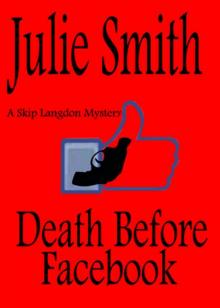 Death Before Facebook (Skip Langdon #4) (Skip Langdon Mystery) (The Skip Langdon Series)
Death Before Facebook (Skip Langdon #4) (Skip Langdon Mystery) (The Skip Langdon Series)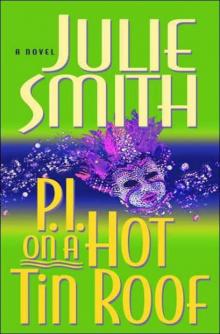 P.I. On A Hot Tin Roof
P.I. On A Hot Tin Roof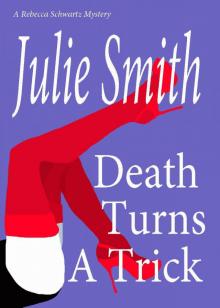 Death Turns A Trick (Rebecca Schwartz #1) (A Rebecca Schwartz Mystery) (The Rebecca Schwartz Series)
Death Turns A Trick (Rebecca Schwartz #1) (A Rebecca Schwartz Mystery) (The Rebecca Schwartz Series)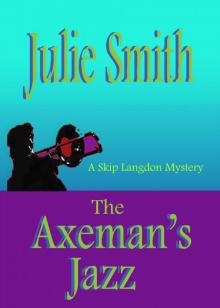 The Axeman's Jazz (Skip Langdon Mystery Series #2) (The Skip Langdon Series)
The Axeman's Jazz (Skip Langdon Mystery Series #2) (The Skip Langdon Series)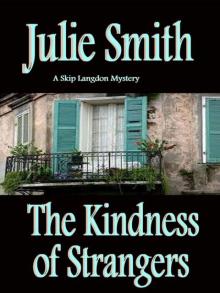 The Kindness of Strangers (Skip Langdon Mystery #6) (The Skip Langdon Series)
The Kindness of Strangers (Skip Langdon Mystery #6) (The Skip Langdon Series)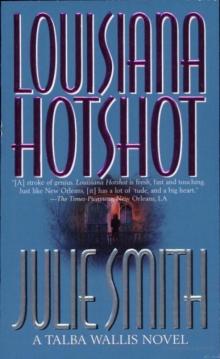 Louisiana Hotshot
Louisiana Hotshot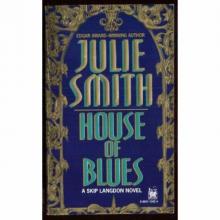 House of Blues
House of Blues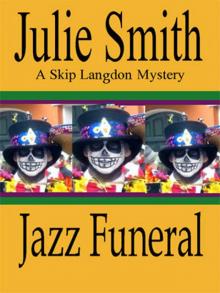 Jazz Funeral (Skip Langdon #3) (Skip Langdon Mystery) (The Skip Langdon Series)
Jazz Funeral (Skip Langdon #3) (Skip Langdon Mystery) (The Skip Langdon Series)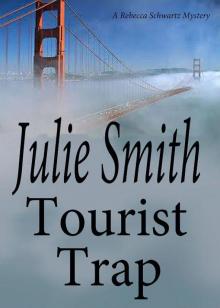 Tourist Trap (Rebecca Schwartz #3) (A Rebecca Schwartz Mystery) (The Rebecca Schwartz Series)
Tourist Trap (Rebecca Schwartz #3) (A Rebecca Schwartz Mystery) (The Rebecca Schwartz Series)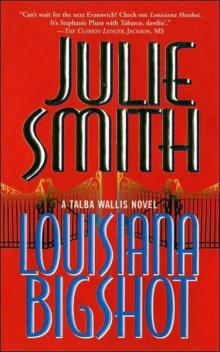 Louisiana Bigshot
Louisiana Bigshot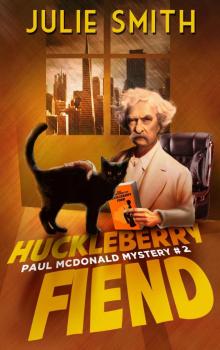 Huckleberry Fiend
Huckleberry Fiend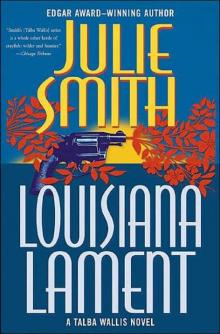 Louisiana Lament
Louisiana Lament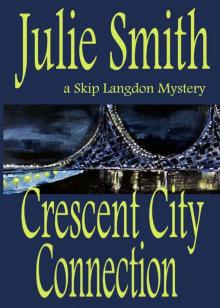 Crescent City Connection (Skip Langdon Mystery #7) (The Skip Langdon Series)
Crescent City Connection (Skip Langdon Mystery #7) (The Skip Langdon Series)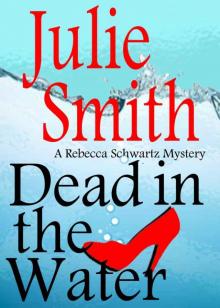 Dead In The Water (Rebecca Schwartz Mystery #4) (The Rebecca Schwartz Series)
Dead In The Water (Rebecca Schwartz Mystery #4) (The Rebecca Schwartz Series)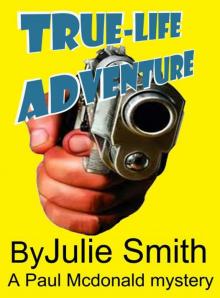 True-Life Adventure
True-Life Adventure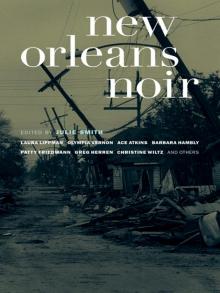 New Orleans Noir
New Orleans Noir